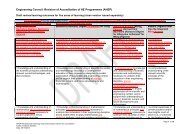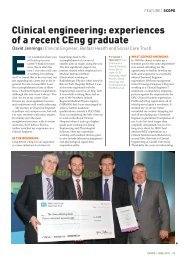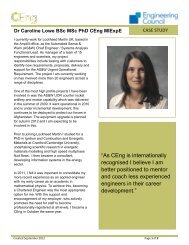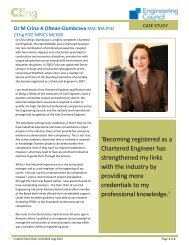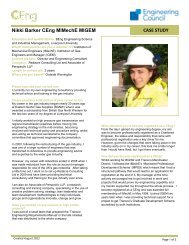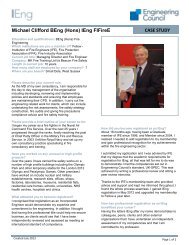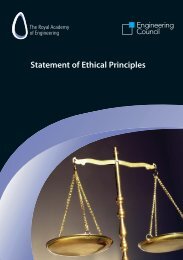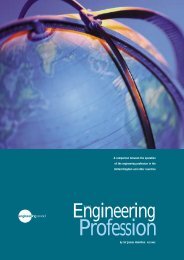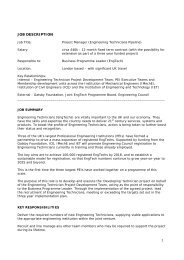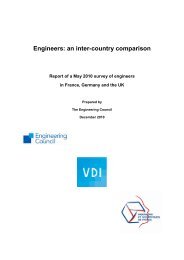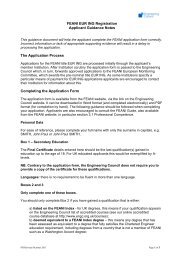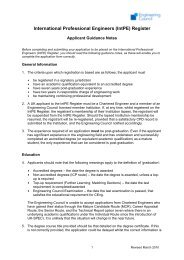An Engine for Change - A Chronicle of the Engineering Council
An Engine for Change - A Chronicle of the Engineering Council
An Engine for Change - A Chronicle of the Engineering Council
Create successful ePaper yourself
Turn your PDF publications into a flip-book with our unique Google optimized e-Paper software.
178A CHRONICLE OF THE ENGINEERING COUNCILDecember 2001The 2 nd Stage – Senate Meeting <strong>of</strong> DecemberAt this vital meeting <strong>the</strong> arrangements <strong>for</strong> <strong>the</strong> NRB, <strong>the</strong> <strong>for</strong>mation <strong>of</strong> Electoral Colleges and adraft supplemental Charter and Bye-laws were presented by Dr Hawley and David Worskett.A new name <strong>for</strong> <strong>the</strong> NRB<strong>An</strong> important step was taken with a fresh recommendation concerning <strong>the</strong> name <strong>of</strong> <strong>the</strong>Chartered part <strong>of</strong> <strong>the</strong> ETB, until now known as <strong>the</strong> NRB. After listening to legal advice anddebates with <strong>the</strong> Institutions, including a meeting <strong>of</strong> Presidents, where <strong>the</strong> ultimately chosenname found approval, <strong>the</strong> Senate considered possible alternatives and agreed that <strong>the</strong> newname should be ‘<strong>Engine</strong>ering <strong>Council</strong> (UK)’ with <strong>the</strong> abbreviation EC(UK), later changed toEC UK .The Shadow ETB Board saw decided advantages in a minimal change because, as it reported,<strong>the</strong> existing <strong>Engine</strong>ering <strong>Council</strong> had developed a ‘brand’ that was recognised and respectedby <strong>the</strong> majority <strong>of</strong> actual and potential Registrants. Equally importantly, it had becomewidely known and admired overseas where it was accepted as a body able to promoteinternational recognition <strong>of</strong> UK engineering qualifications. The new name had beenrecommended by <strong>the</strong> Chairman’s Advisory Group and had been endorsed at <strong>the</strong> first meeting<strong>of</strong> <strong>the</strong> ETB that, by now, had been established with <strong>the</strong> membership identified above. Thenew Charter and Bye-laws would replace <strong>the</strong> Senate while its two Boards (<strong>the</strong> BEP and <strong>the</strong>BER) would be replaced by a single Board. The new EC(UK) Board would comprise 22members, 15 <strong>of</strong> whom were to be elected by <strong>the</strong> licensed <strong>Engine</strong>ering Institutions (so giving<strong>the</strong>m <strong>the</strong>ir long sought representatives), and 7 <strong>of</strong> whom were to be appointed by <strong>the</strong> ETB inorder to provide balance and <strong>the</strong> necessary degree <strong>of</strong> public accountability.The new EC(UK) Board, substantially a replacement <strong>for</strong> <strong>the</strong> BER, reflected <strong>the</strong> narrowerresponsibilities <strong>of</strong> <strong>the</strong> EC(UK) compared with <strong>the</strong> EngC. It was to retain <strong>the</strong> previous Charterresponsibilities <strong>of</strong> <strong>the</strong> BER, including setting standards <strong>for</strong> accredited courses and codes <strong>of</strong>conduct, maintaining <strong>the</strong> Register and licensing Institutions but, on <strong>the</strong> whole, with strongeremphasis on <strong>the</strong> regulatory functions. There were, however, two major new provisions in <strong>the</strong>remit <strong>for</strong> <strong>the</strong> EC(UK). The first was <strong>the</strong> requirement to ‘participate on behalf <strong>of</strong> Registrants,in <strong>the</strong> work <strong>of</strong> <strong>the</strong> <strong>Engine</strong>ering and Technology Board and respond to proposals and enquiriesmade by <strong>the</strong> said Board concerning regulation <strong>of</strong> <strong>the</strong> pr<strong>of</strong>ession’. The second was ‘to act as<strong>the</strong> representative body <strong>of</strong> Our United Kingdom in relation to <strong>the</strong> international recognition <strong>of</strong>Registrants and <strong>of</strong> qualifications in engineering and related subjects and disciplines’. This lastprovision was a welcome <strong>for</strong>malisation <strong>of</strong> a semi-<strong>for</strong>mal arrangement with <strong>the</strong> Institutionsthat had existed, not without difficulties, from <strong>the</strong> early days <strong>of</strong> <strong>the</strong> EngC.The Electoral CollegesThe proposals on Electoral Colleges were made in response to concerns expressed at <strong>the</strong>previous October meeting on <strong>the</strong> question <strong>of</strong> mechanisms <strong>for</strong> democratic processes todetermine <strong>the</strong> membership <strong>of</strong> <strong>the</strong> ETB. Each College would select a number <strong>of</strong> its membersto be put to <strong>the</strong> Nominations Committee <strong>of</strong> <strong>the</strong> ETB. The Nominations Committee, consisting<strong>of</strong> <strong>the</strong> ETB chairman, and two o<strong>the</strong>r Board members toge<strong>the</strong>r with <strong>the</strong> Presidents <strong>of</strong> <strong>the</strong> RoyalAcademy <strong>of</strong> <strong>Engine</strong>ering, <strong>the</strong> Royal Society and <strong>the</strong> <strong>Engine</strong>ering Employers Association,© <strong>Engine</strong>ering <strong>Council</strong> UK 2004



